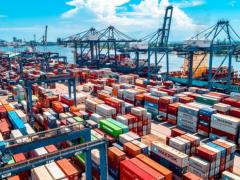The democratisation of global retail has enabled even the smallest brands to reach international audiences overnight, with viral trends triggering surges in demand for products. This growth, led by platforms such as TikTok and marketplaces like Shein and Temu, is reshaping consumer expectations and placing incredible demands on the supply chain and cross- border logistics, according to Michael Henning, Easy Clear general manager. “Freight forwarders face a daunting challenge, managing high volumes, regulatory compliance, tariff classification, duty calculations and payment collections – pressures that have recently seen even Sars EDI systems come under strain. “E-commerce giants are holding agents to KPIs measured in hours, where profit margins vanish with the slightest delay,” he told Freight News. “The only way to scale and remain profitable with these volumes and complexities is to unlock efficiencies through integration and automation of systems within the first and last-mile delivery. Collaboration with role players across the supply chain is key to understanding the challenges and implementing technological solutions that can unlock these efficiencies through the sharing of data between systems that manage warehousing, customs declarations and distribution of goods with minimal intervention.” He said Easy Clear had been working hard to introduce new modules to meet the demands of an international supply chain experiencing phenomenal growth in the e-commerce sector, perishable exports, bulk commodities and stock management. “We are constantly improving all aspects of the software to meet the needs of our air, road, rail and sea freight clients as they manage shipments across global networks.” According to Henning, fear of technology and change remain the biggest barriers to adoption of technology. “Education and conversations with stakeholders, technology partners and industry experts will, however, break down this barrier. The adoption of technology is the only way logistics companies are going to survive in this brave, modern and increasingly challenging environment, where margins are shrinking. Data transparency leaves nowhere to hide when things go wrong.” He said the advancement of artificial intelligence (AI) and automation was creating opportunities across every industry. “The challenge is to harness these technologies without becoming completely reliant on them – a conundrum given how integral they are becoming. Data provides a real-time view of operations, and highlights trends and supply chain disruptions. It also enables predictive analysis, giving early adopters and agile businesses the chance to unlock growth in a fast- moving market.” Training and upskilling staff is critical to ensuring they can use new technologies effectively. “This goes hand in hand with industry knowledge and experience,” said Henning. “We provide onsite and remote training, along with ongoing support, including guidance on Sars- related queries. Skills gaps are most evident in newer companies that rely heavily on software but lack the hands- on experience that becomes crucial when problems arise.” He said going forward, it remained imperative to keep an eye on international trends in technology. “There are interesting developments with AI and its advancement that are percolating with us. In the short term, we are focused on further maturing our existing products and solutions. Looking longer term, we aim to deepen our reach across the continent through integrations with widely used systems such as Asycuda. This will support the e-commerce boom in cross-border trade and unlock growth opportunities for South Africa through new trade partnerships driven by global tariffs.”
Agents face KPIs measured in hours
Comments | 0












